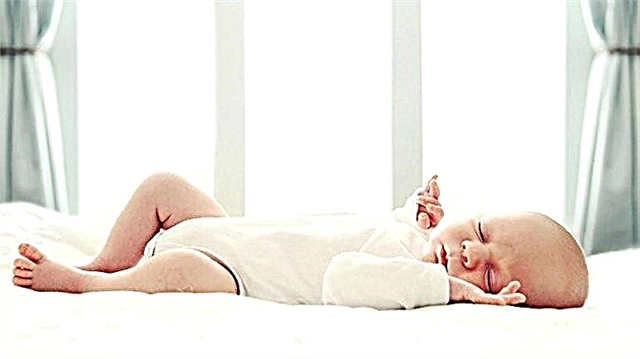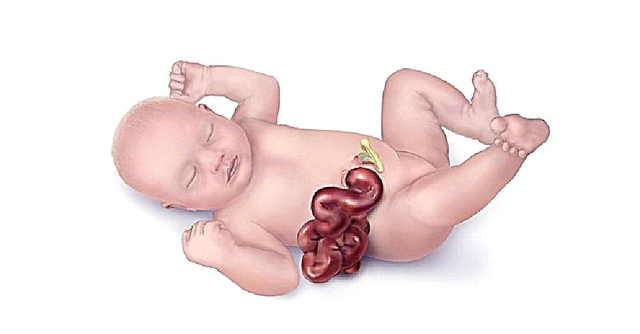
When a child's temperature rises, liquid feces are released and vomiting appears, the most likely cause is an intestinal infection. However, the occurrence of an attack of vomiting is not always accompanied by such symptoms. What will vomiting without elevated body temperature tell about and how to act if a child has such an unpleasant symptom?
How does it manifest?
As a result of the contraction of the muscles of the abdominal wall, stomach and diaphragm, the contents of the child's digestive tract are thrown back through the mouth. Usually, this symptom is preceded by the appearance of nausea - the child has anxiety, the skin turns pale, the pulse quickens, the limbs become cool to the touch. The contents of the stomach are often excreted with a sufficiently high pressure (this vomiting is called a "fountain").
The allocated masses are the remnants of undigested food, may be contaminated, have an unpleasant odor.
What is the normal temperature?
When measured in the armpit, the temperature is considered normal up to 37.3 ° C, although in the first days after birth, the temperature of the baby may be slightly higher (up to 37.5 ° C).
The child's oral temperature is normally between 36.6 ° C and 37.2 ° C, and that measured in the rectum is between 36.9 ° C and 38 ° C.

Symptoms and possible causes, what to do?
The most common causes of vomiting without concomitant fever and changes in stool are non-infectious diseases of the digestive tract and diseases of the nervous system.
In young children, functional vomiting is often observed, caused by intolerance to certain foods or overeating. As a rule, with such vomiting, the state is not disturbed, but it itself is single.
In addition, vomiting may occur with diseases of the pancreas or gallbladder. Pathologies of the endocrine system, in particular, lesions of the adrenal cortex and ketoacidosis in diabetes, also lead to vomiting without fever.
No diarrhea
If bouts of vomiting are not accompanied by stool disturbances, this indicates the absence of intestinal lesions. This clinical picture is typical for diseases of the upper digestive system (stomach, esophagus), pathologies of the central nervous system, endocrine diseases, and poisoning.
In adolescent girls, vomiting can manifest toxicosis during early pregnancy. Also, in adolescent children, the cause of vomiting is alcohol intoxication.
With diarrhea
The appearance of loose stools some time after bouts of vomiting indicates food poisoning. Also vomiting without fever, but with the onset of diarrhea, non-infectious bowel diseases may appear.

Should I call a doctor right away?
Almost always, when an attack of vomiting occurs, you should immediately call a pediatrician, since it is important to quickly determine the cause of vomiting. You can wait to see a doctor only if the child's general condition is intact. If the baby behaves as usual, his sleep is not disturbed, there are no other adverse symptoms, and the temperature has not risen, you can just watch the child. At the slightest suspicion of worsening, seek medical attention.
Call an ambulance immediately if your child:
- Indomitable vomiting, due to which the baby cannot be drunk.
- Additional dangerous symptoms appeared - high fever, liquefied stool, severe pain, impaired consciousness, stool retention, convulsions, drowsiness and others.
- Vomiting was preceded by eating mushrooms or canned foods.
- The child took any medication before vomiting.
- The child hit his head hard.
First aid rules
- If vomiting occurs during feeding, it is stopped, and the baby is given an upright position.
- Wash your child, then give a few sips of plain water to cleanse the mouth.
- If the baby is lying down, his head should be turned to the side. You can also raise it slightly.
- Until the doctor arrives, you need to immediately start giving the child small portions to drink. Give your child water and glucose saline alternately.
- It is impossible to give the baby any medicines, especially antibiotics, antiemetic medicines, potassium permanganate solution and pain relievers, before the doctor examines the child. Such drugs can interfere with the correct diagnosis and worsen the child's condition.

Treatment
The main nuance of the treatment of vomiting is the child's increased drinking regime. Parents should pay maximum attention to soldering crumbs and preventing the development of dehydration. You cannot give any medications to a child whose cause of vomiting has not been established.
As soon as the doctor examines the baby and determines which disease is vomiting, he will prescribe the appropriate treatment. For example, if a baby is diagnosed with any surgical pathology, he will be urgently sent for surgery. The revealed neurological disorders will be the reason for further examination and treatment of the baby under the supervision of a neurologist.
Signs that treatment is working
As prescribed by the doctor, parents should closely monitor the child. It can be considered that therapy helps if:
- The child's well-being began to improve.
- The attacks of vomiting began to appear less frequently, and then stopped.
- The child is more active.
- The baby's appetite has improved.



